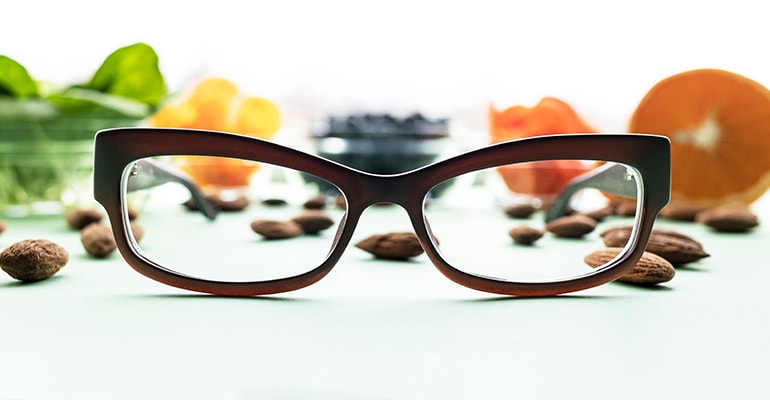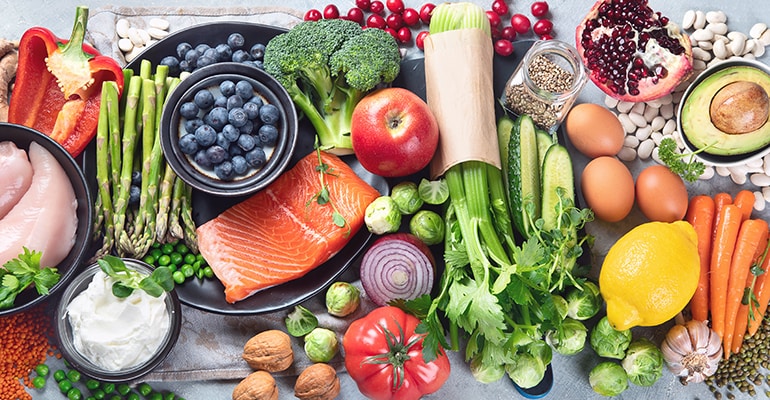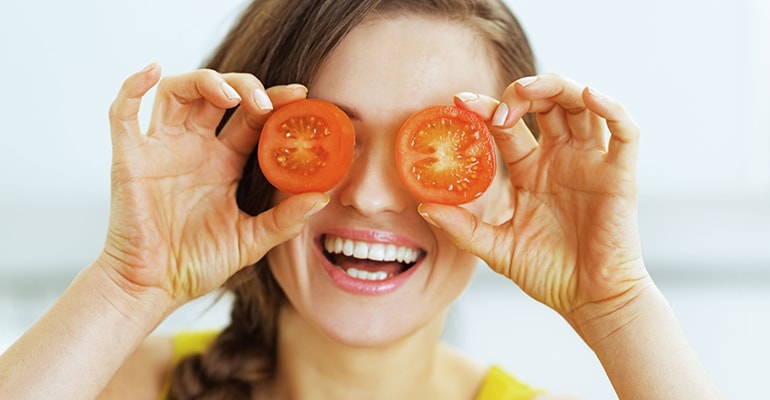Best Foods For Boosting Eye Health & Vision
Aug 09 2024

We all know how important our nutrition is for our overall health, but did you know the foods you eat can impact your vision quality and eye health too?
Our vision will naturally decline with age, but by eating the right foods and taking care of ourselves we can protect our vision from common eye problems in addition to getting routine eye checks and wearing protective eyewear.
So, what foods are best for our vision, and what foods are bad for our eyesight? Find everything you need to know in our guide to healthy eating for your vision below.
How Does Nutrition Impact Vision?
Your nutrition can affect the individual components of your eyes and how they perform, protecting them against vision problems.
Remember, your eyes are made up of delicate organs that rely on tiny arteries for food and nutrients, keeping these healthy will help your eyesight.
-
Photoreceptors - These are made up of two types, rods and cones. They are found at the back of your eye known as the retina and help transmit light. Vitamin A is crucial for these cells to work well, a deficiency can cause eye problems like night blindness and dry eyes.
-
Macular pigments - These are found in the macular tissue of the eye called carotenoids. They are made up of pigments such as lutein and zeaxanthin. Their main role is to protect the back of your eyes from UV light but also reduce the risk of developing age-related macular degeneration which is an eye disease.
-
Eye surface - Your eyes secrete tears to keep them lubricated through the lacrimal and meibomian glands. Diets high in omega 3 can stop you from getting dry eyes or developing DES (dry eye syndrome).
-
Retina - Your retina is responsible for receiving visual signals and sending them to your brain. Fatty acids like DHA docosahexaenoic acid are high in these retina cells, therefore eating foods high in DHA and omega 3 can support your retina health.
-
Aqueous humor - This is the liquid part at the front of your eyeball and is responsible for keeping your eyes healthy, and inflated and regulating the pressure. Vitamin C is found high here, so eating foods high in vitamin C can help support this part of your vision.
-
Nerves and blood supply - Nerves in your eyes help convey messages to the brain and the blood vessels deliver oxygenated blood and remove oxygenated depleted blood. High blood pressure and diabetes can harm these. The two most common causes of vision loss in aging adults are diabetic retinopathy and hypertensive retinopathy.

What Foods Can I Eat To Improve My Eyesight Naturally?
Now we know that our nutrients are important for different parts of our eyes and preventing eye conditions. Which foods contain these nutrients and how much of them should we be eating?
Foods With Vitamin A
Vitamin A can be found in foods such as egg yolks, dairy, and liver. Plants with beta-carotene vitamins are also good as the body can convert them into vitamin A, which can be found in carrots, spinach, and kale.
These foods lower your risk of long-term eye diseases such as AMD and cataracts.
Foods With Lutein & Zeaxanthin
Most foods that contain Lutein and Zeaxanthin have a yellow and orange pigment which makes them easy to spot (although not every food). These foods will help to protect your macular and retina from sunlight.
They can be found in fruits and vegetables such as -
-
Cantaloupe.
-
Corn.
-
Carrots.
-
Orange and yellow peppers.
-
Parsley.
-
Spinach.
-
Kale.
Protein sources such as -
-
Fish.
-
Salmon.
-
Eggs.
-
Oysters.
-
Beef, pork, and chicken (both dark and breast meat).
Beans and grains such as -
-
Chickpeas.
-
Black-eyed peas.
-
Kidney beans.
-
Lentils.
-
Pasta.
It’s recommended to include about 6 milligrams of Lutein and Zeaxanthin in your diet each day to prevent eye diseases like age-related macular degeneration and cataracts.
Most people on average eat about 3 milligrams, so try including more of these foods into your diet slowly.
Foods With Omega-3 Fatty Acids
You can find sources of omega-3 fatty acids in fish such as -
-
Salmon.
-
Sardines.
-
Herring.
-
Tuna.
-
Cod liver.
-
Soybeans.
-
Flaxseed and canola oil.
These foods help keep your vision healthy by nourishing the eyeball and keeping it lubricated to prevent the onset of dry eye and other eye diseases such as AMD and glaucoma.
Foods With High Vitamin C Content
Fruits and veggies when they are at the peak of their ripeness and consumed raw have the highest content of Vitamin C.
These foods in particular protect the health of your eyeball providing vitamins that prevent AMD and slow down cataracts.
Some foods include -
-
Tomatoes.
-
Broccoli.
-
Brussel sprouts.
-
Cabbage.
-
Cauliflower.
-
Potatoes.
Foods With Vitamin E
For foods with Vitamin E try to include the following in your diet -
-
Dark leafy greens such as; kale, spinach, and collard greens.
-
Bright-colored peppers that have Vitamin E and A.
-
Sunflower seeds and nuts such as hazelnuts, peanuts, and peanut butter.
These foods can help prevent eye diseases such as AMD from worsening alongside other nutrients.

What Eating Patterns Can Make Your Vision Worse?
We recommend avoiding foods high in refined sugar or salt, as well as processed foods since they can harm your blood sugar levels and blood pressure.
This could increase the likelihood of contracting eye diseases such as diabetic retinopathy and hypertensive retinopathy.
Eating a healthy balanced diet full of fruits and vegetables, low-fat dairy, fish, poultry, nuts, and seeds is best for your vision since it promotes a high fiber intake and plenty of nutrients. This diet will slow AMD and keep your vision sharp at night.
The Importance Of Getting The Right Glasses With GlassesShop
Not only is proper nutrition essential for healthy eyesight, but so are your glasses. It’s essential to choose glasses that support your vision needs, making sure they fit right and have the correct prescription.
GlassesShop was founded in 2014 and has over 1800 frame styles on offer with customized lenses such as; blue light blocking lenses, photochromic and transition lenses.
We stock prescription glasses, including single vision for distance and reading glasses for near, bi-focal, and progressive glasses. We also have prescription sunglasses such as tinted, photochromic, or mirrored lenses.
Enjoy our buy one get on free deal or free shipping over $69, all our purchases have a 365-day guarantee policy. Shop the full range here.